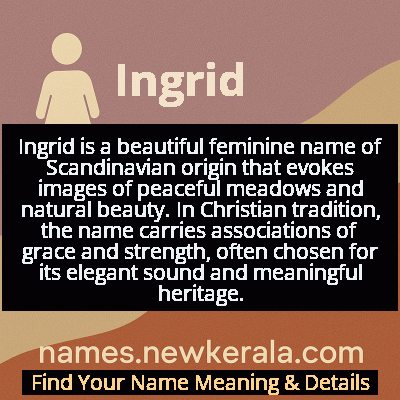Ingrid Name Meaning & Details
Origin, Popularity, Numerology Analysis & Name Meaning of Ingrid
Discover the origin, meaning, and cultural significance of the name INGRID. Delve into its historical roots and explore the lasting impact it has had on communities and traditions.
Name
Ingrid
Gender
Female
Origin
Christian
Lucky Number
7
Meaning of the Name - Ingrid
Ingrid is a beautiful feminine name of Scandinavian origin that evokes images of peaceful meadows and natural beauty. In Christian tradition, the name carries associations of grace and strength, often chosen for its elegant sound and meaningful heritage.
Ingrid - Complete Numerology Analysis
Your Numerology Number
Based on Pythagorean Numerology System
Ruling Planet
Neptune (Ketu)
Positive Nature
Intuitive, analytical, spiritual, and inquisitive.
Negative Traits
Secretive, reserved, aloof, and can be overly critical.
Lucky Colours
Green, yellow.
Lucky Days
Monday.
Lucky Stones
Cat’s eye, moonstone.
Harmony Numbers
1, 5, 6.
Best Suited Professions
Scientists, researchers, spiritual leaders, detectives.
What People Like About You
Depth of knowledge, analytical skills, spirituality.
Famous People Named Ingrid
Ingrid Bergman
Actress
Academy Award-winning Swedish actress known for roles in 'Casablanca' and 'Gaslight'
Ingrid Michaelson
Singer-songwriter
American indie-pop artist known for hits like 'The Way I Am' and 'Girls Chase Boys'
Saint Ingrid of Sweden
Religious figure
Swedish nun and saint who founded the first Dominican convent in Sweden
Ingrid Betancourt
Politician
Colombian-French politician and activist, known for her six-year captivity by FARC rebels
Name Variations & International Equivalents
Click on blue names to explore their detailed meanings. Gray names with will be available soon.
Cultural & Historical Significance
The name's cultural journey reflects Scandinavian migration patterns and international cultural exchange. During the 19th and 20th centuries, as Scandinavians emigrated worldwide, they carried the name to new continents, where it became a marker of Nordic identity. The international fame of Ingrid Bergman in the mid-20th century transformed the name from a regional Scandinavian choice to a globally recognized classic. Today, Ingrid represents a bridge between ancient Norse traditions and modern Christian values, embodying both the strength of Viking heritage and the grace of European sophistication. Its continued use in Scandinavian royal families reinforces its association with dignity and tradition.
Extended Personality Analysis
Women named Ingrid are typically associated with a distinctive blend of strength, intelligence, and natural elegance that creates a compelling personality profile. They often exhibit remarkable inner fortitude and practical wisdom, approaching life's challenges with calm determination and methodical planning. This grounded nature is complemented by a deep appreciation for beauty and culture, making Ingrids often drawn to artistic pursuits, nature, and intellectual exploration. Their strength is not aggressive but rather manifests as quiet resilience and the ability to endure difficulties with grace and dignity.
In social contexts, Ingrids are frequently described as loyal, trustworthy friends who provide stable emotional support to those around them. They tend to be excellent listeners and thoughtful advisors, combining empathy with practical problem-solving skills. Professionally, many Ingrids excel in fields requiring both creativity and analytical thinking, often demonstrating leadership qualities that inspire confidence in colleagues and subordinates. The name suggests someone who values authenticity and depth in relationships, preferring meaningful connections over superficial socializing. This combination of traditional values and modern capability makes Ingrids particularly adept at navigating complex social and professional environments while maintaining their core identity and principles.
Modern Usage & Popularity
In contemporary naming practices, Ingrid has evolved from a strictly Scandinavian choice to an internationally appreciated classic that appeals to parents seeking names with historical depth and cross-cultural appeal. The name maintains strong popularity in Sweden, Norway, and Denmark, consistently ranking within the top 100 names in these countries. Internationally, Ingrid has experienced a renaissance since the early 2000s, particularly in English-speaking countries where vintage names have regained popularity. In the United States, the name has shown steady growth, moving from relative obscurity in the 1990s to moderate popularity today, favored by educated, urban parents who appreciate its sophistication and international flair. The name's appeal lies in its combination of feminine strength, historical significance, and easy pronunciation across multiple languages. Modern usage also reflects a trend toward names that honor heritage while feeling contemporary, with Ingrid fitting perfectly into categories like 'strong female names' and 'international classics' that resonate with today's globally connected families.
Symbolic & Spiritual Meanings
Symbolically, Ingrid represents the beautiful intersection of natural abundance and human cultivation, much like a well-tended meadow that balances wild beauty with purposeful design. The name carries metaphorical weight as a symbol of fertility, growth, and nurturing strength - qualities associated with both its meadow-related meaning and its connection to the Norse god Ing, who governed fertility and prosperity. Ingrid symbolizes the idea that true power often resides in gentle persistence and the ability to create environments where others can flourish. It represents the Scandinavian concept of 'dugnad' - community cooperation and mutual support - reflecting how individuals named Ingrid often become pillars of their communities.
The name also embodies the symbolic tension between tradition and progress, representing respect for heritage while embracing necessary evolution. Like a meadow that changes with the seasons yet maintains its essential character, Ingrid suggests adaptability without loss of core identity. In psychological terms, the name symbolizes integrated strength - the combination of emotional depth with practical capability, intuition with rationality, and independence with community connection. This makes Ingrid a powerful symbolic choice representing balanced wholeness and the harmonious integration of seemingly opposite qualities into a cohesive, effective whole.

